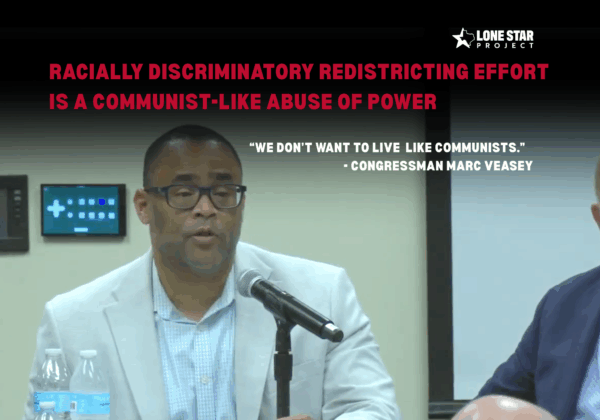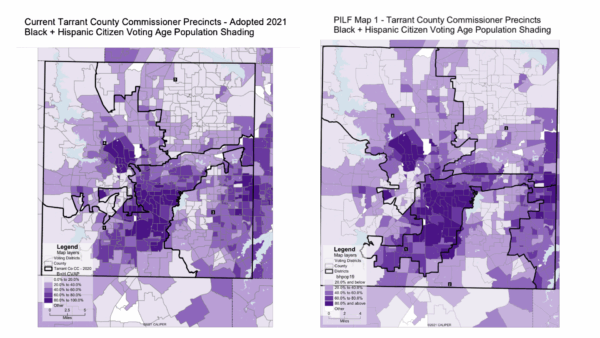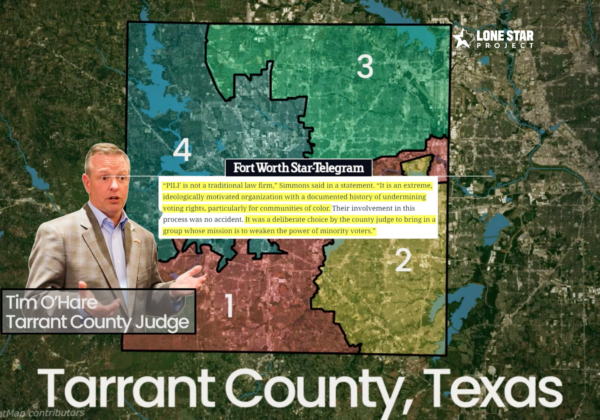Six Texas voters joined with the Texas Democratic Party to file a lawsuit in U. S. District Court, Eastern District of Texas, challenging mail ballot statutes enacted in 2003. Texas Democratic Party officials and legal counsel became aware and concerned about the Texas Attorney General’s vote suppression efforts following the release of reports from the Lone Star Project. The reports raise questions about the legality of Texas Attorney General Greg Abbott’s use of federal grant funds to investigate and prosecute citizens who have participated in mail ballot programs that benefit seniors and the disabled. The Lone Star Project is supporting the legal action taken.
The complaint can be viewed HERE.

Texas AG’s wild goose chase
By The Editorial Board
Thursday, May 22, 2008
After a two-year investigation of voter fraud, Texas Attorney General Greg Abbott has only 26 minor cases of voting irregularities to show for his expenditure from a $1.4 million grant. Some of that money also was spent on other cases.\
All of those cases involved Democrats and 18 of them were instances where lawful voters cast proper ballots that were collected and handled by someone else. That’s technically illegal unless the carrier’s name and address is on the envelope, but it’s a petty prosecution. Actually, the paltry results of Abbott’s initiative are a good thing. It shows that vote fraud is hardly the “persistent problem” Abbott claimed it was when he announced the investigation in January 2006. The outcome of Abbott’s efforts was published by The Dallas Morning News this week.
Republicans in the Legislature have been pushing for a more stringent voter identification law in Texas. Although the issue died in the chaos at the end of the 2007 session, it is sure to return in January. Lt. Gov. David Dewhurst, who has made tougher voter identification a cornerstone of his administration, will see to that.
Nationally, tougher voter identification laws are favorite issues for Republicans, though there is little evidence of widespread voting fraud. Democrats contend that the GOP effort is a way to suppress turnout, since many of the voters who lack sufficient identification are the poor and elderly and minorities – who tend to vote Democratic.
Abbott’s misguided investigation lends credence to the Democrats’ argument. Several of the cases prosecuted by the attorney general’s office involved people helping homebound senior citizens get and mail absentee ballots.
Is this the great voter fraud that Abbott said triggered an investigation into “a dramatic increase in indictments for voter fraud” in his initial press release? If so, it wasn’t worth the time or the money.
In Texas, residents must show identification to obtain a voter’s registration certificate that is to be presented when voting. Properly registered voters who don’t have the registration card when they go to vote still must show another approved form of identification to cast a ballot. So it is highly unlikely that Texas is brimming with illegal voters stealing elections. In his two-year probe, Abbott uncovered only eight cases of ineligible voters or manufactured votes. They included one woman who voted for her dead mother, one man who voted twice and three women who used false addresses to get registration cards.
While it is proper to find and punish anyone voting improperly, if those eight cases are as bad as it gets, Texas is safe from a takeover at the ballot box.
When Republican lawmakers in January again demand tougher regulations on voters to discourage fraud, they should look at the results of Abbott’s assault on what he termed an epidemic of voter fraud.
Voting is a right and a privilege, and Texas legislators should make it easier to vote, not deliberately try to suppress it. There is no need to stiffen voter identification beyond what Texas already requires. And, clearly, there is no epidemic of voter fraud as the attorney general first alleged. His own investigation proved it.

Editorial: Still looking for massive vote fraud
Friday, May 23, 2008
The hunt goes on. And on. And on.
Still, proponents of adding new personal identification requirements at Texas polling places haven’t produced evidence of an Election Day problem that needs fixing.
Attorney General Greg Abbott tried but came up short, despite months of investigating. As detailed recently by Dallas Morning News senior political writer Wayne Slater, Mr. Abbott documented scattered cases of familiar methods of ballot fraud – schemes involving mail-in ballots, false registrations and manipulation of elderly voters.
These despicable acts undermine the democratic system and should be prosecuted based on state and federal laws already on the books.
But warnings from self-styled voting reformers have focused on other kinds of perceived threats to clean elections – patterns of voter impersonation at the polls and massive fraud using illegal immigrants.
Were those threats real, Mr. Abbott most certainly would have provided proof, helping Republican state lawmakers make their case for new laws requiring a photo ID at the polls to go along with the traditional Texas voter registration card.
He didn’t.
In the absence of that proof, GOP legislators appear indifferent to the fact that thousands of registered Texas voters – 150,000 to 400,000, by one estimate – have no photo ID and would face some level of expense to obtain one. Research shows that these voters tend to be elderly, female and poor. They also tend to be Democrats, leaving Republicans to answer to a charge of partisanship.
It should be noted that while research hasn’t produced the long-sought evidence of widespread polling-place fraud, neither has it sustained Democrats’ complaints of voter suppression through photo ID laws.
The absence of hard data in both categories should be a warning to lawmakers who are eager to remake Texas election law next year. A split U.S. Supreme Court upheld the constitutionality of Indiana’s voter ID law last month, guaranteeing momentum for new voter ID proposals in Austin.
There is a simple test for any legitimate voter ID law
: It should not shift new, undue burdens onto registered Texas voters and obstruct their constitutionally guaranteed access to the ballot box



